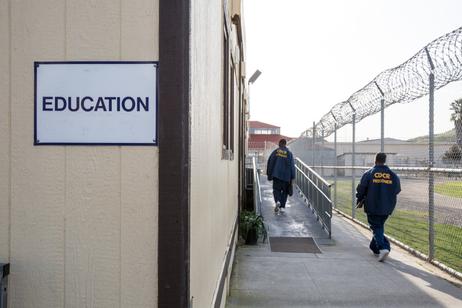Community colleges were intended to help all students access higher education, regardless of socioeconomic or geographical constraints. Subsequently, some community colleges have adjusted their admission policies, allowing undocumented immigrants to enroll on campus.

The Benefits of Community College Minority Mentoring Programs

While all mentoring programs help improve student performance and graduation rates, some community colleges are finding that minority mentorship programs are even more beneficial. Colleges across the country are celebrating the outstanding results achieved through the collaborative efforts of on-campus minority mentoring programs. As the Education Resources Services Center articulates, “Mentoring is a process that can increase the retention of minority students, with larger numbers graduated and hired for faculty positions.”
To discover the benefits of minority mentoring opportunities, consider what some of the top-performing organizations have been able to achieve with their local community college support.
In their paper, Institutionalizing Mentoring in Community Colleges, Dr. Robin Phelps-Ward and Dr. Amanda O. Latz make the point that "Opportunities for institutionalized mentoring in community colleges have the potential to manifest in the promotion and tenure process, faculty development seminars, student recruitment and admissions procedures, and throughout curriculum development. However, colleges must make a concerted effort to weave and explicitly communicate mentoring as a value through mission and vision statements, strategic goals and outcomes, and even course objectives."
This video reports on the minority mentoring initiative at Montgomery County Community College.
Examining the College Student Spectrum
According to the Community College Review-Journal, diversity among community college student populations is constantly shifting. In fact, recent US Census Bureau reports show that 42.3 percent of African Americans enrolled in college programs
Why Congress Has Eliminated Community College Support for Convicted Criminals

While many community colleges have educational incentives to provide reform for convicted criminals, some political leaders are taking an opposing stance. According to recent reports from the San Francisco Chronicle, “Some of the nation's worst sex offenders will no longer be eligible to receive generous educational financial aid packages while they are confined in treatment centers under a bill approved by Congress.”
As political leaders and college presidents strive to balance their budgets amidst a struggling economy, one of the first programs to be eliminated is the financial aid and grants that were available for individuals guilty of serious crimes.
This TEDTalk looks at the issue of prisoner education.
Fighting for Reform
In exploring the recent amendments denying convicted criminals of free tuition and grants, one must first understand how these free college opportunities were even initially created. In truth, allowing convicted criminals to gain access to free publically funded courses was a mere oversight in a much larger educational overhaul. As The Hoya, Georgetown University’s central newspaper, explains, the House of Representatives passed a bill to reauthorize the Higher Education Act in 2008. This act was reinstated in order to provide individuals with enhanced financial aid benefits, and the act allowed individuals to access aid with fewer obstacles and hassles. As a result of this bill, students were able to apply for and receive federally funded student aid Pell Grants throughout the entire year.
Unfortunately, while most students found the
Stuck on a Waiting List? How Community College Students Can Combat College Admission Freezes

Historically, when the economy sputters, community college enrollment rates rise. In facing today’s growing student population, some campuses are struggling under the increased demand. As a result, some community college students have been forced to halt their academic pursuits, finding themselves placed on waiting lists.
Waitlists, which put students in a “line” of acceptance after a school or program’s maximum capacity has been reached, can delay a student’s pursuit of a certification or degree for multiple semesters.
Are Community College Leaders Entitled to Pay Raises Amidst the Recession?

Are Community College Leaders Entitled to Pay Raises Amidst the Recession?
The pandemic of 2020-21 has wreaked havoc on higher education budgets worldwide. Here in the United States, while each state faces its specific economic setbacks, all community colleges have endured significant spending reductions and employee lay-offs.
According to financial experts, community colleges are the most susceptible to these budget cuts, as community college enrollment tends to soar when the economy falters. Wake Technical Community College, one of many North Carolina institutions experienced a 14 percent increase in student enrollment from just last year alone! Considering that public educational institutions subsidize the cost of teaching students, the increased enrollment puts greater financial demands on the campus when their budgets are being slashed.
With soaring enrollment rates, college leaders fear that they will not be able to provide students with the ideal resources, smaller class sizes, and one-on-one time with instructors. Yet, despite these national concerns, some leaders are still raking in higher salaries—regardless of their school’s budgetary shortfalls.
Ron Polaneczky, writing in The Philadelphia Inquirer,r notes that "according to a recent survey conducted by his organization, the compensation of public community-college presidents range from $81,000 to $390,000, not including extra benefits for housing and car expenses. The salary size is influenced by the size of the school, its location, and the number of its students and employees."
Community College Pay Raises: Justified or Unfair?
While several community college leaders have accepted
Recent Articles

















